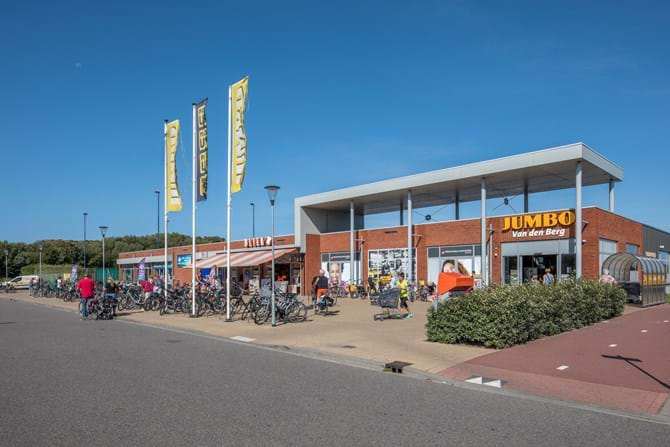- Home EN
- News
- Publications
- 2022
- Bouwinvest steps on the accelerator to improve the sustainability of its retail properties
Bouwinvest steps on the accelerator to improve the sustainability of its retail properties
A focus on high-quality, future-proof and sustainable properties is the key to the success of Bouwinvest’s Dutch Retail Fund strategy. The Fund aims to meet the sustainability targets set out by the Paris Agreement to make all its properties carbon neutral by 2050 and the market is also moving in this direction. But not fast enough, according to Collin Boelhouwer, Director of Dutch Retail Investments at Bouwinvest. He has now launched the idea of a ‘Casco+ (Shell+) lease’ where the landlord rather than the tenant is the owner of all the installations in a bid to accelerate the sustainable transformation of the retail sector.
Bouwinvest aims to contribute to a sustainable, liveable and accessible urban environment while improving pension benefits through its asset management activities: its Dutch Retail Fund is one of the vehicles that invests on behalf of institutional investors. Boelhoewer: “We have successfully adapted the retail fund to the changing retail market in recent years and are constantly optimising the portfolio through active asset management. Based on our proactive and critical acquisition strategy, we spend €50 to €60 million on new or existing retail properties every year. At the same time we also sell retail properties that no longer fit in our strategy, such as De Promesse in Lelystad and De Parade in Begen op Zoom. Last but not least, we also invest heavily in making our retail properties more sustainable through redevelopments and upgrading.”

Experience and convenience
The result, says Boelhouwer, is a retail portfolio which performs above average in a challenging environment. “We focus on the best and high streets in cities (experience) as well as local shopping centres for daily groceries (convenience). Our retail properties on the Damrak in Amsterdam with tenants including Primark, Starbucks and TK Maxx are a good example of experience shopping. Another good example is our Nieuwendijk property with retailers Zara and JD Sports. In Rotterdam, we are the owner of all the retail units under the World Trade Center and a good part of theLijnbaan, where a large Albert Heijn supermarket is located, among others. Our Schuytgraaf convenience shopping centre in Arnhem, Heyhoef in Tilburg and Molenhoek in Rosmalen also deserve a mention.”
With assets under management totalling roughly €1.1 billion and a relative outperformance of 3.2% against the sector benchmark, Bouwinvest’s Dutch Retail Fund was recently named the best-performing specialist real estate fund in the Netherlands by MSCI for the third time in a row. And with a five-star rating according to the Global Real Estate Benchmark (GRESB), the fund has for years ranked among the top 20% of the best-performing real estate funds worldwide. Keep that up, you might say, but Boelhouwer is aiming higher, especially in the area of sustainability. “Not just because we take our responsibility for the energy transition very seriously. We also see it as being critical for the long-term returns of our clients, alongside optimisation and segmentation of our portfolio. We are targeting an almost energy neutral portfolio by 2045 and to achieve that goal, it’s crucial to work closely with our retailers. What concerns me is that we won’t achieve Bouwinvest Retail Fund’s targets if we aren’t able to change existing practices in the retail sector.”
Changing behaviour
The need to take action became very clear last summer when retailers kept their doors wide open on days that were exceedingly hot, Boelhouwer pointed out: “Air conditioners were running full blast which costs a lot of energy. The same thing happens in winter when heating systems are operating at maximum volume with the doors wide open. During talks with our tenants, we pointed out that energy consumption can be cut by 40% if the doors are kept shut on hot or cold days. 40%! The good news is that our research shows customers are just as likely to enter a shop regardless of whether the doors are open or closed. Supermarkets were also reluctant to introduce plastic screens in their dairy sections, but customers got used to it very quickly and appreciated the sustainability driver behind the change.”
Casco+ (Shell+) leases
Bouwinvest invests heavily in renewable energy sources in its properties, for example by covering shopping mall roofs with solar panels and equipping stores that have been insulated with heat pumps. A good example of this is the company’s recently transformed store in the PC Hooftstraat – one of the main high streets in Amsterdam. It implemented every available sustainability measure it could in close consultation with the new tenant Filippa K, which resulted in a very energy-efficient shop. Bouwinvest also advises and assists tenants in reducing their energy consumption, Boelhouwer added: “What complicates our attempts to make our portfolio more sustainable is that it is standard practice to let retail units as empty shells. In contrast to the office market, the tenant rather than the landlord almost always owns the installations. That’s not a good starting point for the enormous sustainability task we all face.”
Boelhouwer clarifies the point by citing the example of a retailer with a five-year lease. “That is standard practice in the dynamic retail world. It offers tenants the possibility after five years to respond to changing market conditions and move to a bigger or smaller space if desired. Those dynamics also explain why retailers are reluctant to invest in sustainability measures. Why would you invest in a fuel-efficient heat pump if there’s a real chance you’ll leave in a few years’ time?”
“Retailers themselves also benefit, of course, from low energy consumption, especially now that energy prices are rising so quickly because of the Russian war in Ukraine. But we need to do more to realise the urgently needed sustainability drive in the retail sector. It’s time for a new generation of leases where installations belong to the landlord. Bouwinvest is willing to invest in this ‘Casco+’ or Shell+ lease to gain experience.”

It is logical to charge a slightly higher rent for such a ‘Casco+’ lease, Boelhouwer said: “The benefit for retailers is they don’t need to make the initial investment themselves. They can also depend on the landlord to invest in sustainable installations that minimise energy consumption as much as possible. Landlords will also benefit financially from this construction in the long term. Demand for energy-efficient stores will increase further in the near future. Sustainable investments will remain profitable, even if a tenant leaves suddenly due to bankruptcy, for example. It’s a win-win situation.”
Sharing energy data
Boelhouwer also sees a need to share energy data in addition to using a ‘Casco+’ lease. “Tenants are currently reluctant to share energy data at present, possibly because they fear the data will be used against them. That fear is not justified in my opinion. Sharing data allows landlords to compare energy consumption in retail units and quantify the returns of investing in sustainability measures. That also gives landlords a stronger case to show how sustainability investments are environmentally and financially beneficial to their tenants.”
Mandatory energy label
Boelhouwer stressed it is not just him who is eager to take the lead in accelerating the sustainable transformation of the retail environment. Bouwinvest stands behind him, he said: “My focus as Director Dutch Retail Investments is, of course, on our own retail portfolio. In that context, I would like to call for the introduction of a mandatory mininum energy-consumption label along the lines of the mandatory C label that is being implemented in the Dutch office sector in 2023. A mandatory minimum energy label would also significantly accelerate the implementation of sustainability measures in the retail sector. It would be a logical next step to current sustainability initiatives and, in combination with the adoption of the ‘Casco+’ lease and the proactive sharing of energy data across the sector, it would greatly contribute to the urgent need to curb energy consumption in the retail market. I am sure of that.”
